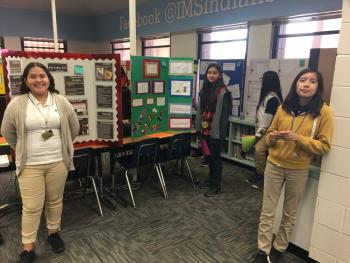
Student Investigators in Science

- School:
- Immokalee Middle
- Subject:
- Science
- Teacher:
- Melanie Villa
- Students Impacted:
- 325
- Grade:
- 6-8
- Date:
- August 4, 2021
- Deadline:
- October 31, 2021
Investor
Thank you to the following investor for funding this grant.
Harry Debes Family Foundation - $1,300.00
Original Grant Overview
Goal
The goal is for as many students as possible to participate in a school-wide science fair. Many students in our school community face financial hardships. Acquiring materials for an experiment with multiple trials and creating a board worthy of the student's ideas can be costly. It is my hope we can assist students who need to purchase materials so they can fully participate and compete in our school science fair and hopefully go on to compete in our regional and state science fair as well.
What will be done with my students
Science fair is a very challenging but rewarding process. Students must stretch beyond typical classroom expectations and immerse themselves in the scientific process they study about in class everyday.
Science fair challenges students to seek an answer to a question they have developed based on a problem they see in their everyday lives or a topic which interests them. This helps the student to be engaged in the project and to see how science relates to their everyday life.
After deciding a topic, they research it and develop a question, that can be tested. Students practice looking for reliable sources, documenting their sources, reading, and processing information to see what they can use. Students must decide what types of experimental trials they need, how many trials, and which materials they need to conduct their experiment. Students organize, plan, and strategize. They take ownership and pride in their work.
After the trials are complete, students must analyze their data and draw conclusions, which strengthens their critical thinking skills. Students also ponder what future experiments can be done and how their data is relevant to everyday life.
After completing a board, students then present their finished project to a group of judges from our school and community, which strengthens their interpersonal skills.
Science fair is a place where all students can come together and participate on their own level. Gifted students can be challenged to push deeper and think harder. Students with learning disabilities in self-contained classes, who are often separate from the general school population, take pride in presenting what they have learned. English language learners can do a hands-on investigation and practice their new language in a fun setting with supportive adults.
Many have been impressed with how the science fair competition has brought our school together in past years. We have even had multiple students conquer regionals and go on to win awards at the state competition! With your generous support, we can continue the tradition with a new group of students.
Benefits to my students
Though this process, students will engage with and develop a deeper understanding of the Nature of Science
benchmarks, while exploring topics which are interesting to them and may lead them to a future STEM career. Students will practice their communication skills while presenting their project to multiple community members and school faculty.
"Nature of Science" is the category of our science curriculum our students have traditionally struggled with the most. Some of the benchmarks students will engage with are the following:
SC.8.N.1.1 Define a problem from the science curriculum
SC.8.N.1.2 Design and conduct a study using repeated trials and replication.
SC.8.N.1.3 Use phrases such as "results support" or "fail to support"
SC.8.N.1.4 Explain how hypotheses are valuable if they lead to further investigations, even if they turn out not to be supported by the data.
SC.8.N.2.2 Discuss what characterizes science and its methods.
Budget Narrative
*Science fair boards run about 70-$100 for 25 boards.
*Past materials students have requested include: plants, soil, cups, light bulbs, popsicle sticks, paint, cloth material, soaps, and many other items we don't have available at the school. It is difficult to list them specifically because it depends on the ideas of the students
*The medals are to award the top 12-13 science fair winners who will go on to Regionals, along with a student choice award. Each participant will receive a ribbon.
*Board materials include glue, paper, letters, and printing costs (We usually print color pictures for students at Kinkos for them to place on their boards from photos they have taken during their trials.)
Items
| # | Item | Cost |
|---|---|---|
| 1 | 120 Science fair boards | $500.00 |
| 2 | Materials for students with financial hardships | $500.00 |
| 3 | 12-15 Medals to award top projects & ribbons | $100.00 |
| 4 | Materials to create boards (glue, letters, borders) | $200.00 |
| Total: | $1,300.00 |



Share
Please share this page to help in fulfilling this grant.
Email to a Friend